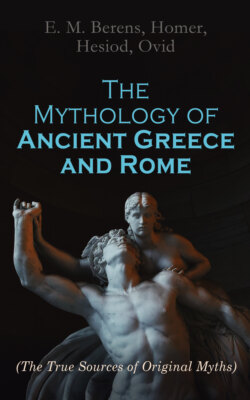Читать книгу The Mythology of Ancient Greece and Rome - Homer - Страница 9
На сайте Литреса книга снята с продажи.
Cronus
ОглавлениеTable of Contents
Cronus was the god of time in its sense of eternal duration. He married Rhea, daughter of Uranus and Gæa, a very important divinity, to whom a special chapter will be devoted hereafter. Their children were, three sons: Aïdes (Pluto), Poseidon (Neptune), Zeus (Jupiter), and three daughters: Hestia (Vesta), Demeter (Ceres), and Hera (Juno). Cronus, having an uneasy conscience, was afraid that his children might one day rise up against his authority, and thus verify the prediction of his father Uranus. In order, therefore, to render the prophecy impossible of fulfilment, Cronus swallowed each child as soon as it was born, greatly to the sorrow and indignation of his wife Rhea. When it came to Zeus, the sixth and last, Rhea resolved to try and save this one child at least, to love and cherish, and appealed to her parents, Uranus and Gæa, for counsel and assistance. By their advice she wrapped a stone in baby-clothes, and Cronus, in eager haste, swallowed it, without noticing the deception. The child thus saved, eventually, as we shall see, dethroned his father Cronus, became supreme god in his stead, and was universally venerated as the great national god of the Greeks.
Anxious to preserve the secret of his existence from Cronus, Rhea sent the infant Zeus secretly to Crete, where he was nourished, protected, and educated. A sacred goat, called Amalthea, supplied the place of his mother, by providing him with milk; nymphs, called Melissae, fed him with honey, and eagles and doves brought him nectar and ambrosia. He was kept concealed in a cave in the heart of Mount Ida, and the Curetes, or priests of Rhea, by beating their shields together, kept up a constant noise at the entrance, which drowned the cries of the child and frightened away all intruders. Under the watchful care of the Nymphs the infant Zeus throve rapidly, developing great physical powers, combined with extraordinary wisdom and intelligence. Grown to manhood, he determined to compel his father to restore his brothers and sisters to the light of day, and is said to have been assisted in this difficult task by the goddess Metis, who artfully persuaded Cronus to drink a potion, which caused him to give back the children he had swallowed. The stone which had counterfeited Zeus was placed at Delphi, where it was long exhibited as a sacred relic.
Cronus was so enraged at being circumvented that war between the father and son became inevitable. The rival forces ranged themselves on two separate high mountains in Thessaly; Zeus, with his brothers and sisters, took his stand on Mount Olympus, where he was joined by Oceanus, and others of the Titans, who had forsaken Cronus on account of his oppressions. Cronus and his brother-Titans took possession of Mount Othrys, and prepared for battle. The struggle was long and fierce, and at length Zeus, finding that he was no nearer victory than before, bethought himself of the existence of the imprisoned Giants, and knowing that they would be able to render him most powerful assistance, he hastened to liberate them. He also called to his aid the Cyclops (sons of Poseidon and Amphitrite), who had only one eye each in the middle of their foreheads, and were called Brontes (Thunder), Steropes (Lightning), and Pyracmon (Fire-anvil). They promptly responded to his summons for help, and brought with them tremendous thunderbolts which the Hecatoncheires, with their hundred hands, hurled down upon the enemy, at the same time raising mighty earthquakes, which swallowed up and destroyed all who opposed them. Aided by these new and powerful allies, Zeus now made a furious onslaught on his enemies, and so tremendous was the encounter that all nature is said to have throbbed in accord with this mighty effort of the celestial deities. The sea rose mountains high, and its angry billows hissed and foamed; the earth shook to its foundations, the heavens sent forth rolling thunder, and flash after flash of death-bringing lightning, whilst a blinding mist enveloped Cronus and his allies.
And now the fortunes of war began to turn, and victory smiled on Zeus. Cronus and his army were completely overthrown, his brothers despatched to the gloomy depths of the lower world, and Cronus himself was banished from his kingdom and deprived for ever of the supreme power, which now became vested in his son Zeus. This war was called the Titanomachia, and is most graphically described by the old classic poets.
With the defeat of Cronus and his banishment from his dominions, his career as a ruling Greek divinity entirely ceases. But being, like all the gods, immortal, he was supposed to be still in existence, though possessing no longer either influence or authority, his place being filled to a certain extent by his descendant and successor, Zeus.
Cronus is often represented as an old man leaning on a scythe, with an hour-glass in his hand. The hour-glass symbolizes the fast-fleeting moments as they succeed each other unceasingly; the scythe is emblematical of time, which mows down all before it.
